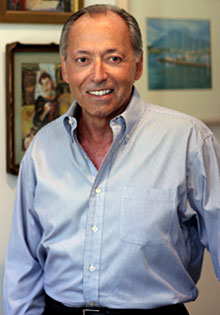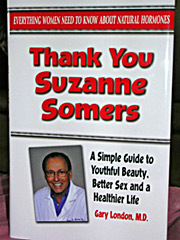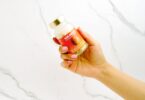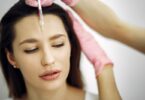
I sat down with Dr. London at his Beverly Hills office. I was amazed when he walked into the room. It was easily apparent that this was a doctor who walked the talk. At 71, he had the face and energy of a man much younger. He shared his medical background and how he ended up specializing in anti-aging, the whole concept about aging and the bright light at the end of the tunnel?
Dr. London on Why We Age:
My practice is unusual in that I don?t treat illness; what I?m doing is treating a natural consequence of life. We are genetically programmed to get old. We?re genetically programmed to have one purpose in life, which is to perpetuate the species and move on. Just like all the other animals and trees and everything else. We reach a peak where we?re supposed to be the healthiest, the strongest, most attractive, best able to attract a mate, best able to reproduce a healthy offspring and that?s about age 25. So, at age 25, all your systems are working best, you?re most resistant to disease, your immune system is high, your muscle tone is good, you respond to exercise?all those things.
Then when we reproduce, we have an offspring that matures very slowly?we?re not like sharks that come out ready to swim and hunt?so for our offspring we have to hang around and take care of them for about 15 years. So we get a free pass as humans, from about age 25 though 40, where all of our hormones and all our functions stay at their best. That is when we are at “optimum levels”. And after 40, you?re supposed to get out of the way; you?re supposed to make room for the 25 year olds to perpetuate the species. It?s a very sad story! This is the point in my lectures everyone starts to slump in their seats… .
Then at age 40-50, our hormones start to taper off, and in the females, very dramatically. They stop producing eggs, they no longer can produce, they literally are taken out of the reproductive cycle. So, age 40?50, hormones taper off, and age 50-60, they drop even further. So by 60?I don?t care who you are, I don?t care who your parents were, I don?t care how well you take care of yourself; all your hormones that are responsible for your body’s health are way lower than they were at their optimum level. And what happens at that phase is that your cells in your body lose their ability to reproduce good, healthy cells. That?s what aging is.
On the Aging Process:
Because I was a gynecologist, my practice was limited to women. I dealt with menopause in the standard way: treating them with estrogen and progesterone. Then I realized it was more than just ovarian failure. Because their husbands would come to the lectures and talk, and they had basically the same problems: as they got older they got more body fat, less lean muscle mass, they didn?t sleep well at night, they didn?t respond to exercise, their sex drive decreased, their energy level went down?so they were going through the same aging changes.
Your cells have lifecycles; you?re constantly killing off and reproducing billions of cells. Early in life your cells have the ability to reproduce healthy cells, so when you?re young and healthy, go to the gym and workout and have good nutrition, then the cells that replace the ones that leave are better?bigger, healthier, stronger. When you?re young you can go to the gym and work out and get big biceps and bigger arms and respond to exercise. When you?re older, the cells are replaced by weaker cells, so that your muscles as you get older get a little smaller, a little softer, a little less efficient. Well, that wasn?t a sad story when we only lived 50 or 60 years. It wasn?t a bad life cycle; you were born, got taken care of till you were 15, matured to 25, stayed good until 40 and tapered off at 50 or 60 and went away. But we don?t do that anymore. From age fifty you probably have another forty or fifty years to be here.
On Reversing the Process:
So we are saying, ?but wait a minute, I don?t want to be in the decline phase for forty or fifty years.?? We have done things to perpetuate longer life: we sterilize our water, we eat better, we don?t get diphtheria, we don?t get run over by buffalo. There are a lot of reasons that we are hanging around longer. The basic purpose of my practice is to help people extend that plateau of health and vitality. So instead of beginning to decline at 35 or 40, you can delay it until 60 or 70 or 80.
Eventually your body looses its ability to make better cells. You run out of genetic materials, the machine just breaks down.? But it doesn?t have to be at 40 or 50.? I know we can stretch it out.? I wondered years ago if you could take a forty-year-old that wasn?t in particular good shape and have him exercise and eat well, and make him look better, feel better be healthier at 50 than at 40. How about 50 to 60? How about 60 to 70?
On His Own Experience:
My personal goal, like most people, is still to look good as long as possible.? But the older we get, the more important it becomes to feel good.? Now, my goal is to feel as good at 80 as I did at 40.? I used to wonder if that was possible.? I don?t exercise a lot.? And I am certainly not on a restrictive diet ?but I keep my hormone levels where they should be and that?s what makes the difference. With properly balanced hormones and basic exercise and nutrition, you can maintain lean muscle mass and you do get rid of body fat. My goal of feeling good at 80 is getting close.? I only have nine years to go and I will prove that you CAN do it to 80, at least.? Can you do it to 90?? Probably not.? Can you do it to 100.? Absolutely not.? I have never seen a 100-year-old that was strapping and healthy and vigorous. I?m doing for myself what I do for my patients; I am stretching out this healthy phase of life.? It is doable.? And I can tell you that it is possible.
On His Book:

On His Program:
To properly evaluate a person?s hormone status, prescribe the appropriate hormones and then continue to monitor the doses requires a great deal of a physician?s time.? It can only be done by testing blood hormone levels and retesting periodically. That makes a program like mine fairly expensive.? Everybody is different, and everybody responds differently, so a program has to be customized for each person.
All of your hormones work together: Estrogen, progesterone, thyroid, testosterone, growth hormone, etc. They are all inter-related, so it is important to get them all at an optimum level.? In my program, a patient first goes through an Evaluation Phase.? They complete a personal profile, then an in-depth past medical history, including medications and hormones they may have taken, a family history and anything else that may affect their health status.? Then an extensive panel of baseline blood tests is done.? Based upon all of that information, I can tell them ?This is what your current hormone status is, and this is what you should be taking to be at your optimum levels.? The fee for that full evaluation is $1,250 dollars.
If it is determined that a patient would benefit from hormone supplementation, we go to the Treatment Phase.? I assume responsibility for management of their hormone program for the year. I order their hormones and adjust them as necessary, and we talk every couple weeks to see how they are doing and feeling. The full panel of blood tests is repeated in about three months, then again in another three months.? The fee for the year?it is an annual program?is another $3,750. I realize that is a substantial commitment for a person to make, but the alternative is going down that inevitable path of aging.
You are genetically programmed to go that route. You know where you are headed.? Look at your grandmother at 60. Look at her grandmother if she got to 60. They didn?t expect to be healthy and vivacious and attractive at 60.? But you do and you should. You expect to be pretty and attractive and healthy when you are 60.? And be able to do all the things you want to do, and have a clear mind, sleep well and have energy. That is what my program is designed to help people do. That is all I do now, and with good results.
On Male Hormone Therapy:
My practice used to be limited to females because I was a gynecologist.? In a busy practice like mine, with just a few minutes with each patient, there just isn?t enough time to talk about hormone supplementation and aging.? So I began gathering groups of 10-15 in the evening and doing workshops. Pretty soon the women began bringing their husbands along.
The husbands started asking ?well what about us??? A man hits about 45-50 and he notices he is getting a big belly, man boobs and smaller, softer arms.? He used to be a jock in school, so he goes to the gym and works out.? He works out two days a week, then three days a week, even five days a week.? But nothing happens.? And after about six months of that, he stops going to the gym.? Because you don?t keep up that effort if you don?t get results.? And he can?t get results because he has low levels of testosterone, growth hormone, thyroid, and DHEA.? And it doesn?t just affect the way he looks.? He also has less energy, less endurance, lower sex drive and poorer performance.? Every man, just like every woman, is destined to slip down that slippery slope of aging unless they do something to combat it.
In the past, men haven?t paid as much attention to their hormones as women have.? Things are changing and more and more men are coming to me to show them how to build muscle, get rid of fat, look better and feel better. I have as many men as women in my practice now.
Dr. Gary London, M.D.
9201 Sunset Blvd.
West Hollywood, CA
310-270-4500
[email protected]







